November 2, 2025 | 10:34 GMT +7
November 2, 2025 | 10:34 GMT +7
Hotline: 0913.378.918
November 2, 2025 | 10:34 GMT +7
Hotline: 0913.378.918
Thanh Tan Commune, now renamed Binh Minh, was once known as the custard apple capital of Tay Ninh province. However, in recent years, the rise of plant diseases affecting custard apple trees, coupled with unstable prices, has caused many growers to struggle. Quite a few households have boldly shifted to other crops such as cucumbers, melons, and grapes. Among them, the model of intercropping coconuts with strawberries in the Japanese style, combined with eco-tourism, developed by Mr. Nguyen Thanh Vu, is seen as a green, sustainable direction that delivers dual benefits.
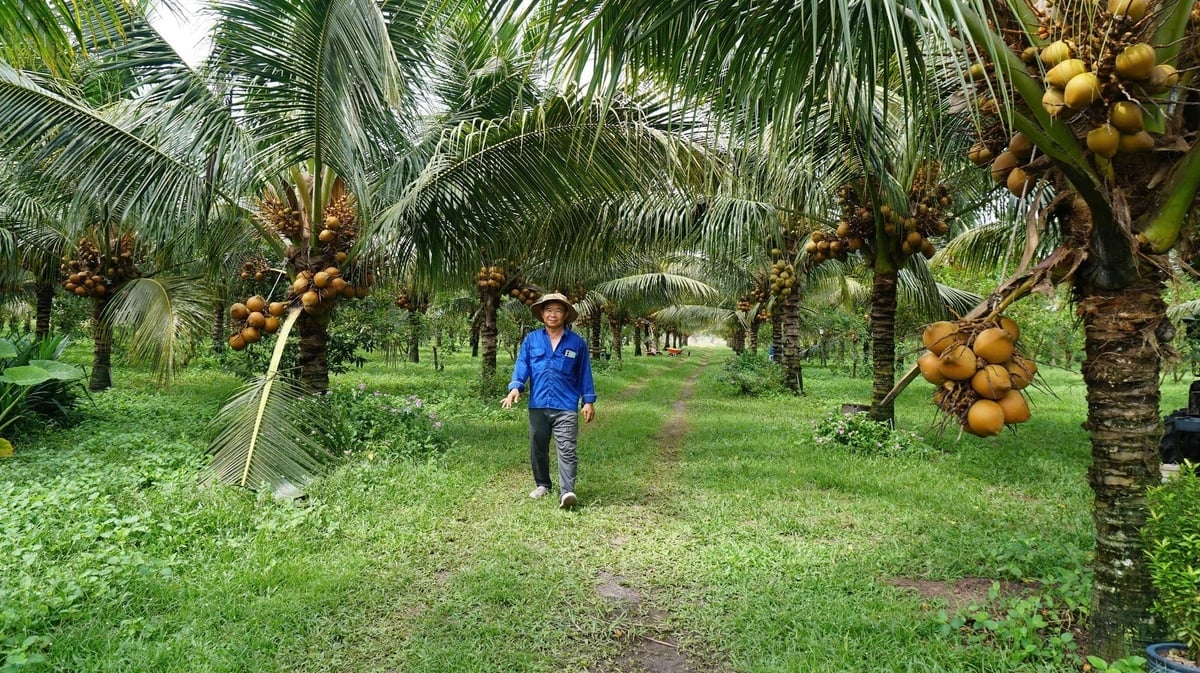
Vu’s organic coconut garden in Binh Minh Commune. Photo: Tran Trung.
Guiding us through the rows of neatly planted coconut trees swaying with heavy clusters of fruit above a carpet of green grass, Mr. Vu shared his journey with coconuts: “Before becoming attached to coconut farming, I had spent many years working in the fertilizer and agricultural supplies sector at a Japan-Vietnam joint venture company. That working environment gave me the chance to learn a great deal from Japanese agricultural practices."
From the experience he gained, Vu realized that coconuts have many advantages: they are easy to grow, simple to care for, and adaptable to various soil types whether sandy loam, clay, or alluvial soil, as long as drainage is sufficient. In particular, coconuts bear fruit year-round, making them highly suitable for eco-tourism development. Seizing this advantage, he decided to invest in organic coconut farming combined with tourism, and has already achieved encouraging initial success.
According to Vu, although Tay Ninh is not as fertile as the Mekong Delta, it has the advantage of abundant agricultural by-products such as sugarcane bagasse and cassava residue, which are excellent organic materials for soil improvement. "Our land has plenty of sunshine, and coconuts here yield very sweet water. With proper soil improvement, productivity and quality can absolutely rival those of coconuts from the Mekong Delta," Vu affirmed.
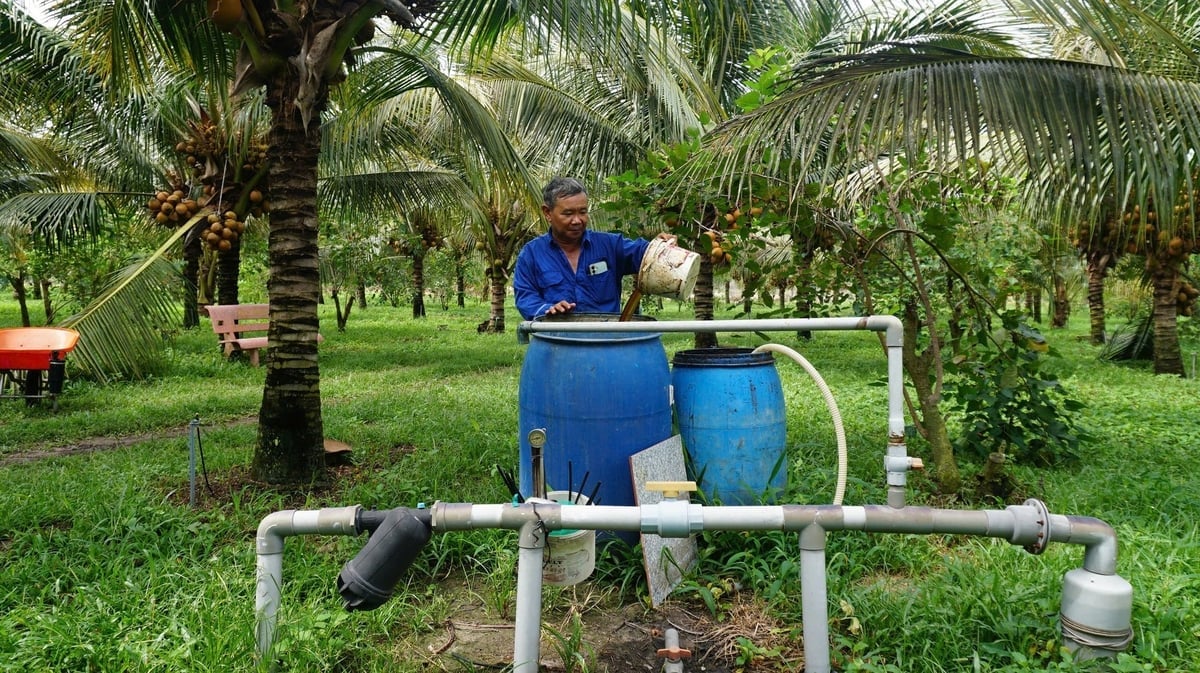
Mr. Vu uses IMO bio-preparations combined with an automatic fertigation system to care for his orchard. Photo: Tran Trung.
Vu’s secret to effective coconut cultivation begins with soil improvement. Before setting up the orchard, he collected sugarcane bagasse and cassava residue, piled them up for composting, and added microorganisms to speed up decomposition. After about six months, once the compost had fully matured, he tilled and mixed it into the soil, while also supplementing medium and trace elements such as fused phosphate to improve soil pH and enrich mineral content.
Although coconuts are drought-tolerant, they still need adequate water during the growth stage. Vu invested in an automatic irrigation and fertigation system, which maintains proper soil moisture while ensuring a stable nutrient supply, especially beneficial in the dry season. At the same time, he fostered a favorable soil ecosystem for earthworms by keeping natural ground cover, clearing only around the tree bases, while cutting and mulching the rest as a long-term organic source for the orchard.
Pest and disease management is another area Vu prioritizes, following a biosecurity-oriented approach. According to him, the most dangerous pest for coconuts is the red palm weevil, which attacks the growing tip. To counter this, he chose a hybrid Siam coconut variety with a harder trunk that helps resist the insect. In addition, he applies preventive methods such as sprinkling coarse salt around the crown or hanging salt bags on the growing tips, using granular biological pesticides around the base to control nematodes, and supplementing with nano-microbes along with molasses to both improve the soil and suppress fungal diseases.
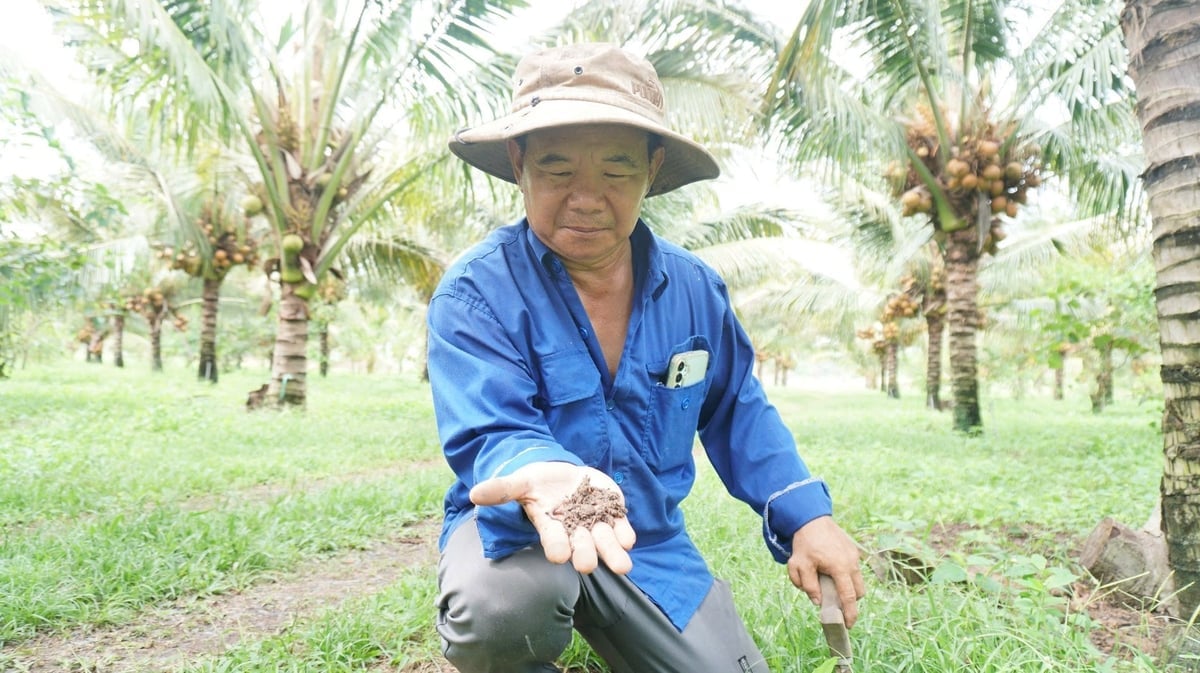
Healthy soil and thriving earthworms help coconuts grow well. Photo: Tran Trung.
"Currently, my coconuts are distributed through multiple channels such as fresh sales, export, and processing. Thanks to the consistent application of technical solutions, the fruits from my garden are of very high quality. Beyond being clean and safe, the market requires a minimum sweetness level of 7 Brix, while my coconuts always reach over 9 Brix, which makes them highly favored by consumers," Vu shared.
In recent years, Tay Ninh’s tourism sector has gradually affirmed its position, attracting large numbers of both domestic and international tourists. With Ba Den Mountain Tourist Area as the focal point, the province has been working with relevant partners to develop various agriculture-linked tourism models. This direction has shown promising results, meeting the growing demand for authentic experiences from visitors.
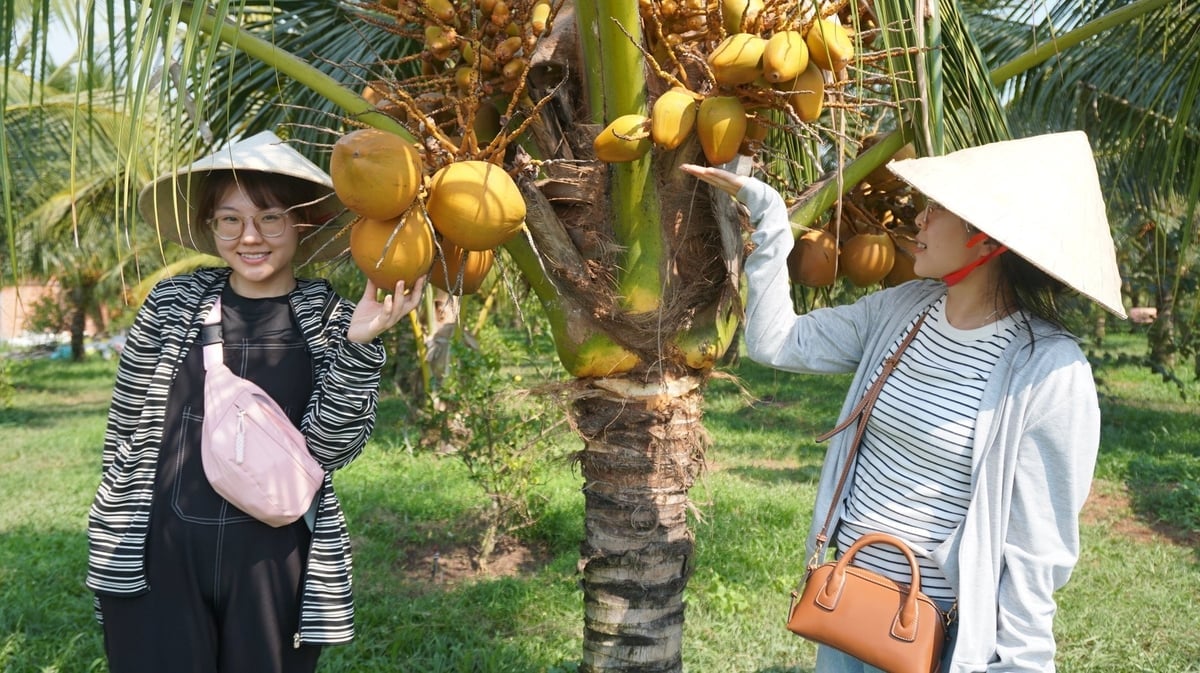
Visitors exploring Mr. Vu’s organic coconut garden. Photo: Tran Trung.
Within this broader picture, Nguyen Thanh Vu’s organic coconut garden has become an ideal destination for tourists visiting Tay Ninh. Since the garden began harvesting, many groups of visitors from both inside and outside the province have come to explore and experience it. They enjoy the refreshing, clean environment, witnessing the organic farming process firsthand, picking coconuts themselves, tasting them on the spot, and choosing their favorite fruits to take home as gifts.
"I chose to grow organic coconuts not only for economic efficiency but also with the desire to create a sustainable agricultural model linked with eco-tourism. By making use of Tay Ninh’s climate and abundant organic resources, along with applying modern farming techniques, I believe organic coconuts can provide stable income, protect the soil, preserve the environment, and at the same time introduce visitors to a green and clean countryside worth experiencing," Vu emphasized.
Commenting on this model, Mr. Ha Thanh Tung, Deputy Director of Tay Ninh Provincial Agricultural Extension Center, said that Tay Ninh has many advantages for tourism, with agricultural tourism being a potential model that has not been fully tapped. Farmers' bold development of agriculture in combination with tourism has opened up new opportunities for the local agricultural sector.
"We are actively supporting businesses to build linkages that create products capable of attracting visitors. Mr. Vu’s organic coconut garden is a new, suitable, and effective tourism product, promising to become a highlight of Tay Ninh’s tourism industry in the near future," Mr. Tung shared.
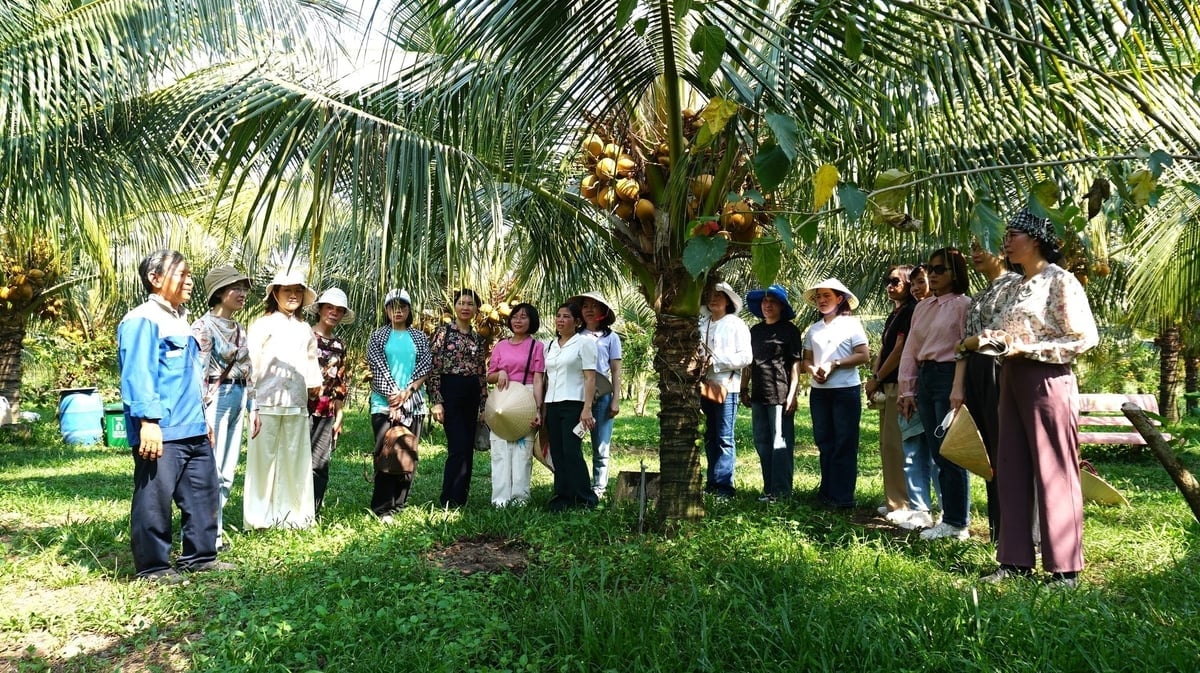
Mr. Vu (far left) shares his secrets of organic coconut production with visitors. Photo: Tran Trung.
According to Mr. Ngo Tran Ngoc Quoc, Chairman of the Tay Ninh Tourism Association, with its inherent advantages, the province is gradually developing various agriculture-based tourism models that are already showing clear potential. Around the Ba Den Mountain area, many agri-tourism destinations created by local farmers have emerged, ranging from high-tech farming models to garden tourism.
"We need to create distinctive products to set Tay Ninh tourism apart. In the coming time, the Association will build a symbiotic ecosystem, connecting all members across tourism sectors to collaborate, foster community strength, and move towards green tourism development, thereby creating breakthroughs for the province’s tourism industry," Mr. Quoc emphasized.
Drawing on years of experience working with Japanese partners and his deep understanding of his homeland’s natural advantages, Nguyen Thanh Vu has transformed the neat rows of organic coconuts in Binh Minh into a vivid testament to modern agricultural thinking. Not only do his trees produce sweet fruits that meet export standards, but his model also paves the way for green agriculture linked with eco-tourism - a bright spot contributing to Tay Ninh’s effective use of its fertile land and abundant sunshine along the border region.
Translated by Kieu Chi

(VAN) Out of over 20 chicken farms in Trung Cao hamlet (Phu Nghia commune, Hanoi), only those of Pham Thi Le and Pham Van Thuc still pursue this rare trade.

(VAN) Kim Anh commune (Hanoi) has proactively implemented measures to protect livestock herds, maintaining a “safety shield” for local livelihoods.

(VAN) Farmers in Tuyen Quang are effectively adopting the contact-free livestock model to control pathogens and keep their pig herds safe.

(VAN) Phu Tho is promoting the development of specialty fruit-growing areas following VietGAP and GlobalGAP standards, with planting area codes and traceability systems, aiming toward a green and sustainable agriculture.

(VAN) After years of intensive cultivation, agricultural soils are becoming exhausted. Efforts to restore soil health and regenerate soil ecosystems are now being initiated.

(VAN) Expanding the smart coffee cultivation model not only contributes to increasing farmers’ income but also enhances climate change adaptation in the Central Highlands.

(VAN) A comprehensive MRV process for high-quality rice cultivation has been finalized and is now ready to accurately measure and assess emission reductions.